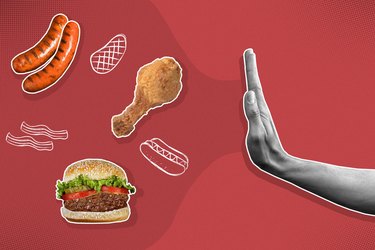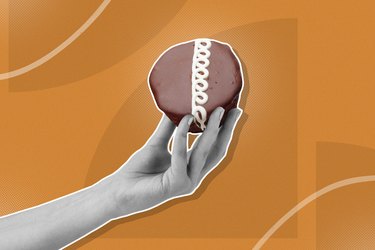
For many dieters, New Year's Day marks the start of a 21-day Daniel Fast, a period of temporarily abstaining from certain foods and drinks with the intention of getting closer to God and/or jumpstarting a New Year's resolution to lose weight.
But you don't have to be driven by faith to give it a try. Read on to learn more information on the Daniel Fast and its potential benefits.
Video of the Day
Video of the Day
What Is the Daniel Fast?
The 21-day Daniel Fast is inspired by two lines of scripture found in the Old Testament's Book of Daniel, Chapter 10, verses 2-3: "In those days I Daniel was mourning three full weeks. I ate no pleasant bread, neither came flesh nor wine in my mouth, neither did I anoint myself at all, till three whole weeks were fulfilled."
The prophet Daniel was born roughly 600 years before Christ, according to the international association United Church of God, and was described as a "paradigm of spiritual resilience," according to the Chabad-Lubavitch Media Center.
He is said to have been in a time of deep personal grief. He undertook his three-week fast in an effort to spiritually and physically purify himself during "a season of penitential humiliation and prayer," according to The Book of Daniel, With Notes and Introduction.
Today, modern interpretations of the Daniel Fast vary. There are many Daniel Fast cookbooks, workbooks, guides and journals available, and the guidelines often differ from one to another. Some prohibit caffeine, and others don't. Some allow fruit juices, while others ban all drinks other than water. Some say eating canned food is OK; others allow only fresh, whole foods during the fasting period.
Prayer journals, spiritual meditations and Biblical study are often recommended in addition to the dietary protocols.
The prophet Daniel's personal three-week fast boiled down to four directives: Eat no bread, eat no meat, drink no wine and do not anoint yourself. Those who undertake the Daniel Fast today typically focus on its dietary aspects, but keep scrolling to explore all components of the original Daniel's fast.
Related Reading
Eat No Bread
Many modern-day Daniel Fast-ers interpret this as a directive to abstain from eating not only bread but also processed foods, refined carbs, sugars and all products containing yeast.
Eat No Meat
As described by an older but frequently cited September 2010 study in Lipids in Health and Disease, the Daniel Fast is "devoid of animal products and preservatives, and inclusive of fruits, vegetables, whole grains, legumes, nuts and seeds."
Generally speaking, those who undertake the Daniel Fast temporarily become vegans who avoid eating any meat, dairy, fish, seafood, eggs or anything else that comes from animals.
Drink No Wine
Many people who do the Daniel Fast today take this as a directive to abstain from alcohol completely for three weeks.
Do Not Anoint Yourself
People who follow the Daniel Fast today often skip this aspect of the Biblical Daniel's personal fast. In Daniel's day, "To anoint oneself with oil was a sign of joy, and to omit it was a sign of sorrow," according to The Book of Daniel, With Notes and Introduction.
Biblical scholars say Daniel would have anointed himself with olive oil when he wasn't fasting.
Reflect
Though not explicitly stated in the two lines of scripture related above, it's implied that Daniel spent his three-week fasting period mourning and repenting — that is, grieving painful losses and acknowledging and atoning for hard-to-face mistakes.
Modern Evangelical fasters may spend the three weeks studying the Bible, praying, journaling and setting spiritual intentions for the coming year. But fasters of any (or no) faith can use the time to process the events of the past year, strengthen personal relationships and establish new, life-affirming habits and goals.
Tip
The Daniel Plan, started by pastor Rick Warren with input from three doctors — Daniel Amen, Mark Hyman and Mehmet Oz — is a long-term lifestyle program that centers on faith, food, fitness, focus and friends, according to the Daniel Plan website and is different from the Daniel Fast, which only shifts eating habits for a short period of time.
What Are the Benefits of the Daniel Fast?
It Could Promote Weight Loss
Cutting back on bread and other ultra-processed foods has been linked to weight loss. In a July 2021 randomized controlled trial in Clinical Nutrition, people with obesity who ate whole-grain products lost more body fat and weight than those who ate similar products made from refined wheat.
Animal foods also tend to be higher in calories and fat than plant foods. Removing animal foods from your diet for three weeks during the 21-day fast may reduce your calorie intake and facilitate weight loss.
"Plant-based diets can reduce body fat via a variety of mechanisms, which cumulatively lead to reduced calorie intake and increased energy expenditure," according to a November 2019 article in Nutrients.
Research specifically investigating the Daniel Fast is hard to come by, though. One small December 2013 study in Senior Research Projects reported moderate weight loss, increased calorie burn at rest and changes in fat burned at rest after 28 days on the fast (seven days longer than ordinary).
It is important to note, however, that this particular study was carried out by the religious institution Southern Adventist University. Given that the nature of the Daniel Fast is a religious one, the benefits reported may be biased due to the participants' religious beliefs.
It's Linked to Improved Mental Health
Plant-based diets were associated with improvement in emotional and physical wellbeing, depression and quality of life in a March 2018 BMJ Open Diabetes Research & Care study.
Three weeks of sobriety may also improve your mental wellbeing. "Some people might discover their alcohol use was ... disrupting their sleep, contributing to conflicts, or that they relied more on alcohol for stress relief than they thought," George F. Koob, PhD, director of the National Institute on Alcohol Abuse and Alcoholism wrote in a blog post.
It May Help You Process Grief
Processing deep feelings around grief, regrets and mistakes (as Daniel did) can be an important emotional recovery tool.
Journaling can reduce stress and anxiety and improve your overall mood, according to the University of Rochester Medical Center. Putting your fears and concerns on paper can help you prioritize problems, identify negative thoughts and behaviors and give you the chance to practice positive self-talk.
It Can Help Foster Connection
If you share your Daniel Fast with a group — as is often the case — you can build or bolster social connections, and having strong social ties is linked to living a longer, healthier life, according to the Harvard T. H. Chan School of Public Health.
"Social connection is essential throughout a person's lifespan," per a September 2021 review in Aging and Health Research. "A robust body of scientific evidence has shown that lacking social connection is an indicator of premature mortality comparable to many leading health indicators."
It's Linked to Other Physical Health Benefits
Simply cutting back on ultra-processed foods can be a boon for your health. The September 2010 Lipids in Health and Disease study, for example, found that the Daniel Fast improved risk factors for metabolic and heart diseases.
And "a 10 percent increase in the proportion of ultra-processed foods in the diet was associated with a significant increase of greater than 10 percent in risks of overall [cancer] and breast cancer," according to a February 2018 review in the BMJ.
Warning
Even though there are potential health benefits that can come from the Daniel Fast, there are some drawbacks to keep in mind, too. The main concern: It's an overly restrictive plan meant to function as a quick-fix; it's not a sustainable plan for long-term weight loss.
Consult your primary care physician before beginning the Daniel Fast (or any fast). They can help you ensure that your nutritional needs will be met during the fast and advise you as to whether or not vitamin and mineral supplementation will be necessary. They can also help direct you toward more sustainable weight-loss diets.
- All About Prayer: "Daniel Fast"
- Lipids in Health and Disease: "Effect of a 21-Day Daniel Fast on Metabolic and Cardiovascular Disease Risk Factors in Men and Women"
- Nutrition & Metabolism: "A 21-Day Daniel Fast With or Without Krill Oil Supplementation Improves Anthropometric Parameters and the Cardiometabolic Profile in Men and Women"
- Lipids in Health and Disease: "Both a Traditional and Modified Daniel Fast Improve the Cardio-Metabolic Profile in Men and Women"
- Current Diabetes Reports: "Health Benefits of Fasting and Caloric Restriction"
- Clinical Nutrition: "A Hypocaloric Diet Rich in High Fiber Rye Foods Causes Greater Reduction in Body Weight and Body Fat Than a Diet Rich in Refined Wheat"
- British Medical Journal: "Consumption of Ultra-Processed Foods and Cancer Risk"
- Harvard Health Publishing: "What Are Ultra-Processed Foods and Are They Bad for Our Health?"
- Nutrients: "Plant-Based Diets in the Reduction of Body Fat"
- U.S. News and World Report: "What Happens to Your Body If You Go Vegan for a Month?"
- BMJ Open Diabetes Research & Care: "Effectiveness of Plant-Based Diets in Promoting Well-Being in the Management of Type 2 Diabetes"
- National Institute on Alcohol Abuse and Alcoholism: "Director's Blog — Taking a Break from Alcohol Can be Good for Your Health"
- United Church of God: "Introduction to the Book of Daniel"
- Chabad-Lubavitch Media Center: "Daniel the Prophet of the Bible, His Life and Accomplishments"
- Google Books: "The Book of Daniel, with Notes and Introduction"
- University of Rochester Medical Center: "Health Encyclopedia — Journaling for Mental Health"
- Harvard T. H. Chan School of Public Health: "An Active Social Life May Help You Live Longer"
- Aging and Health Research: "Approaches to Enhance Social Connection in Older Adults"
- Harvard Business Review: "Managing Yourself — The Dark Side of Self-Control"
- King James Bible: "Daniel Chapter 10"


